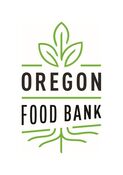
Oregon Food Bank works to eliminate hunger and its root causes...because no one should be hungry. Oregon Food Bank believes that communities thrive when people are nourished, and that everyone deserves healthy and fresh food. Many locations are shopping-style markets that allow families to select food that matches cultural and dietary needs.
Oregon Food bank has a distribution network of 21 regional food banks serving Oregon and Clark County, Washington, partnering with more than 1,400 free food markets, pantries, meal sites and delivery programs. Oregon Food Bank also lead statewide efforts to increase resources for hungry families and to eliminate the root causes of hunger through public policy, local food systems work, nutrition and garden education, health care screening and innovative programming. Find out how to feed the human spirit at oregonfoodbank.org.
- Today, 1 in 10 people face hunger in rural, urban and suburban communities throughout the state. Driven by the ongoing economic fallout of COVID-19 and sunsetting pandemic safety nets, the rising cost of food and housing, and entrenched systems that perpetuate poverty, we are in an ongoing hunger crisis and it is not slowing down.
- The rising cost of food and housing is worsening food insecurity in Oregon, Southwest Washington and across the country. Last year, OFB saw 1.9 million visits to food assistance sites — a 14% increase from the previous year.
- Food insecurity disproportionately affects specific communities in Oregon, regardless of geography. Historic inequities and systematic exclusions mean that Black, Indigenous, and Communities of Color, immigrants and refugees, single moms and caregivers, and trans and gender-diverse communities are two to three times more likely to face hunger and poverty in our region. By addressing these disparities we can ensure everyone in our state has access to the essential resources we need to thrive.
- Poverty is the single biggest driver of hunger. When people earn a living wage, have access to affordable housing, healthcare and education, and no longer face the barriers of systemic discrimination, we're all better equipped to buy healthy and nutritious food. Together, we can ensure that food remains available to all who need it today- and make the kind of changes that are needed to end hunger for good!